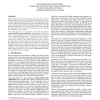Free Online Productivity Tools
i2Speak
i2Symbol
i2OCR
iTex2Img
iWeb2Print
iWeb2Shot
i2Type
iPdf2Split
iPdf2Merge
i2Bopomofo
i2Arabic
i2Style
i2Image
i2PDF
iLatex2Rtf
Sci2ools
102
Voted
ICCD
2005
IEEE
2005
IEEE
Counter-Based Cache Replacement Algorithms
Recent studies have shown that in highly associative caches, the performance gap between the Least Recently Used (LRU) and the theoretical optimal replacement algorithms is large, suggesting that alternative replacement algorithms can improve the performance of the cache. One main reason for this performance gap is that in the LRU replacement algorithm, a line is only evicted after it becomes the LRU line, long after its last access/touch, while unnecessarily occupying the cache space for a long time. This paper proposes a new approach to deal with the problem: counter-based L2 cache replacement . In this approach, each line in the L2 cache is augmented with an event counter that is incremented when an event of interest, such as a cache access to the same set, occurs. When the counter exceeds a threshold, the line “expires”, and becomes evictable. When expired lines are evicted early from the cache, they make extra space for lines that may be more useful, reducing the number of ca...
Cache Replacement | Hardware | ICCD 2005 | Optimal Replacement Algorithms | Replacement Algorithms |
Related Content
| Added | 16 Mar 2010 |
| Updated | 16 Mar 2010 |
| Type | Conference |
| Year | 2005 |
| Where | ICCD |
| Authors | Mazen Kharbutli, Yan Solihin |
Comments (0)

